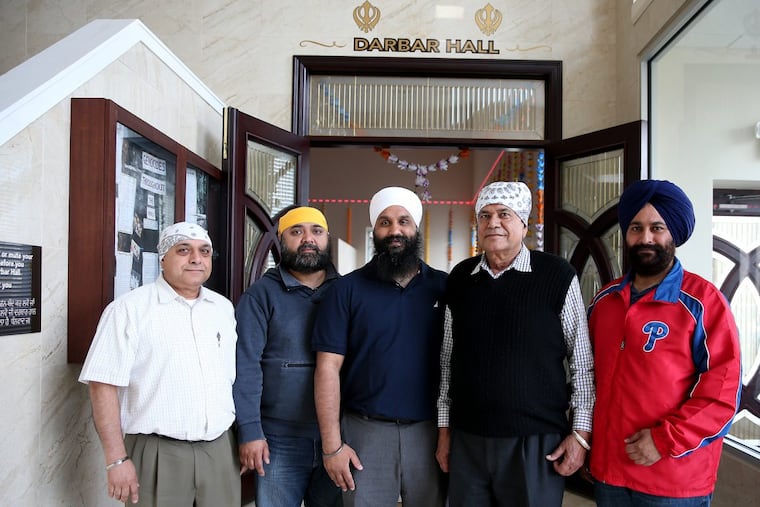New Jersey Sikhs seek to promote awareness through acts of charity and faith
New Jersey Sikhs trying to break down barriers through service to the community.

Once a month, on a given Saturday, volunteers from the South Jersey Sikh community meet for several hours in downtown Camden to put their faith into action by distributing home-cooked meals to the homeless.
The service project will take on extra meaning this month as the faithful celebrate Vaisakhi, the most significant of the annual Sikh gatherings that mark the spring harvest in India's Punjab region. This year, the festival coincides with the first Sikh Awareness Month in New Jersey.
About 300 people are expected to partake in the service of langar, or free community meals, said Tony Rahil, the project director. About a dozen volunteers will help serve traditional Indian vegetarian dishes, mostly beans and rice and rice pudding, near the Walter Rand Transportation Center.
Launched in 2012, the community service project follows one of the basic tenets of Sikhism, the fifth-largest world religion, by performing selfless acts of service to others. Sikhs in Jersey City, Newark, Glen Rock, and Trenton also regularly provide meals to the needy.
Tony Rahil, a Sikh, started a project to feed the homeless in Camden in 2012. "We really feel strongly about it," said Rahil, of Voorhees, a real estate agent. "You're blessed to do the work."
Rahil and Sikh leaders are trying to break down barriers and dispel stereotypes about Sikhs, who have been the target of hate crimes. They want to develop relationships with people of different faiths and backgrounds, especially in service projects such as feeding the homeless.
"Most of the people in the U.S., all they see are the turbans," said Jagvinder S. Chattha, 45, of Westampton, an auto wholesaler. "We have not clarified our identity to our neighbors."
This month, Gov. Murphy signed a bill designating every April in New Jersey as Sikh Awareness Month. New Jersey is home to about 100,000 Sikh Americans, one of the largest populations in the country. It is estimated that about 500,000 Sikhs live in the United States (The Census Bureau doesn't ask questions about religion so there is no official count.) Worldwide, there are more than 25 million Sikhs.
Lawmakers said they hope the measure would help counter bigotry and educate the public about Sikhism, often wrongly viewed as a combination of Islam and Hinduism. Their distinct physical identity — unshorn hair and turbans for men and head coverings for women — make them easily identified and targeted for hate crimes.
"As we see a surge in hate crimes this year, so also is a surge in our resolve to heal with love," Manwinder Singh, director of United Sikhs,said in a statement.
In New Jersey and elsewhere, there have been a spate of hate crimes and attacks against Sikhs, especially after the 9/11 terrorist attacks. In Hightstown, the turban of a Sikh student was set on fire by a classmate in 2008. In Wisconsin, six Sikhs were killed during a hate-crime attack at a gurdwara, a place of worship, in 2012. Ravi Singh Bhalla, who took office in January as Hoboken's first Sikh mayor, has reported receiving death threats.
Rahil said Sikhs have been warmly embraced by the community in Pine Hill, where his family belongs to one of the oldest gurdwaras in New Jersey, Sikh Gurdwara Pine Hill. Located on a busy stretch of Blackwood-Clementon Road, the gurdwara is a center for learning, worship, and gathering for the faithful.
A steady stream of congregants came to the temple Friday, where a 48-hour worship service for Vaisakhi will conclude Saturday to celebrate their history and rededication to their religious traditions. Before entering, they removed their shoes and covered their heads. They reverently approached the Guru Granth Sahib, the Sikh scripture, which sits on a throne in the center of the ornate room, and bowed as a sign of submission.
In a nearby room, a priest and members took shifts reciting scriptures without interruption. In the kitchen, three women prepared spices for langar after Friday night's worship service.
A first-generation Sikh American, Rahil founded a nonprofit, Sachkhand Express Corp., that began the Camden project distributing fresh fruit in Farnham Park in the city's Parkside section several years ago. He moved the project downtown to reach more people and began providing hot meals and giving out toiletry packages.
Rahil said the volunteers, who are greeted warmly when they pull up in a white bus, dole out generous portions, including seconds if requested. They give hugs, too, but do no preaching, although religious materials are available, he said.
"It's not just about the meal. You want to share words with them and encourage them to keep fighting," he said. "We're all God's children."
About 100 people, mostly from the congregation, support the project with donations and fundraisers, Rahil said. It costs about $800 a month to feed the crowd. A core group of about 15 to 25 volunteers distributes food on a Saturday, he said.
"You feel very comfortable when you help somebody," said Parminder Singh, 61, of Voorhees, a gas station retailer. "It gives you peace of mind."